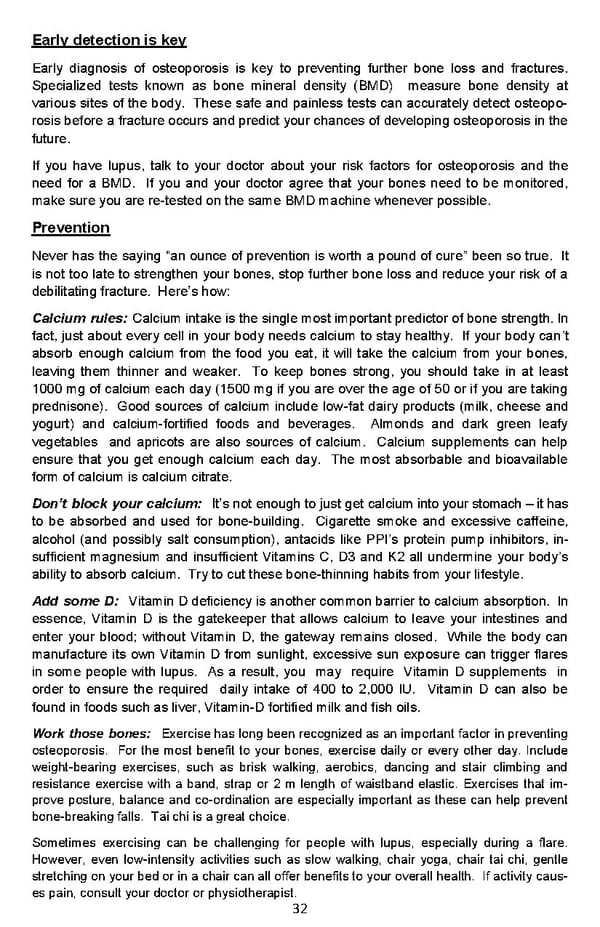Early detection is key Early diagnosis of osteoporosis is key to preventing further bone loss and fractures. Specialized tests known as bone mineral density (BMD) measure bone density at various sites of the body. These safe and painless tests can accurately detect osteopo- rosis before a fracture occurs and predict your chances of developing osteoporosis in the future. If you have lupus, talk to your doctor about your risk factors for osteoporosis and the need for a BMD. If you and your doctor agree that your bones need to be monitored, make sure you are re-tested on the same BMD machine whenever possible. Prevention Never has the saying “an ounce of prevention is worth a pound of cure” been so true. It is not too late to strengthen your bones, stop further bone loss and reduce your risk of a debilitating fracture. Here’s how: Calcium rules: Calcium intake is the single most important predictor of bone strength. In fact, just about every cell in your body needs calcium to stay healthy. If your body can’t absorb enough calcium from the food you eat, it will take the calcium from your bones, leaving them thinner and weaker. To keep bones strong, you should take in at least 1000 mg of calcium each day (1500 mg if you are over the age of 50 or if you are taking prednisone). Good sources of calcium include low-fat dairy products (milk, cheese and yogurt) and calcium-fortified foods and beverages. Almonds and dark green leafy vegetables and apricots are also sources of calcium. Calcium supplements can help ensure that you get enough calcium each day. The most absorbable and bioavailable form of calcium is calcium citrate. Don’t block your calcium: It’s not enough to just get calcium into your stomach – it has to be absorbed and used for bone-building. Cigarette smoke and excessive caffeine, alcohol (and possibly salt consumption), antacids like PPI’s protein pump inhibitors, in- sufficient magnesium and insufficient Vitamins C, D3 and K2 all undermine your body’s ability to absorb calcium. Try to cut these bone-thinning habits from your lifestyle. Add some D: Vitamin D deficiency is another common barrier to calcium absorption. In essence, Vitamin D is the gatekeeper that allows calcium to leave your intestines and enter your blood; without Vitamin D, the gateway remains closed. While the body can manufacture its own Vitamin D from sunlight, excessive sun exposure can trigger flares in some people with lupus. As a result, you may require Vitamin D supplements in order to ensure the required daily intake of 400 to 2,000 IU. Vitamin D can also be found in foods such as liver, Vitamin-D fortified milk and fish oils. Work those bones: Exercise has long been recognized as an important factor in preventing osteoporosis. For the most benefit to your bones, exercise daily or every other day. Include weight-bearing exercises, such as brisk walking, aerobics, dancing and stair climbing and resistance exercise with a band, strap or 2 m length of waistband elastic. Exercises that im- prove posture, balance and co-ordination are especially important as these can help prevent bone-breaking falls. Tai chi is a great choice. Sometimes exercising can be challenging for people with lupus, especially during a flare. However, even low-intensity activities such as slow walking, chair yoga, chair tai chi, gentle stretching on your bed or in a chair can all offer benefits to your overall health. If activity caus- es pain, consult your doctor or physiotherapist. 32
 Living Well With Lupus Facts Booklet Page 31 Page 33
Living Well With Lupus Facts Booklet Page 31 Page 33